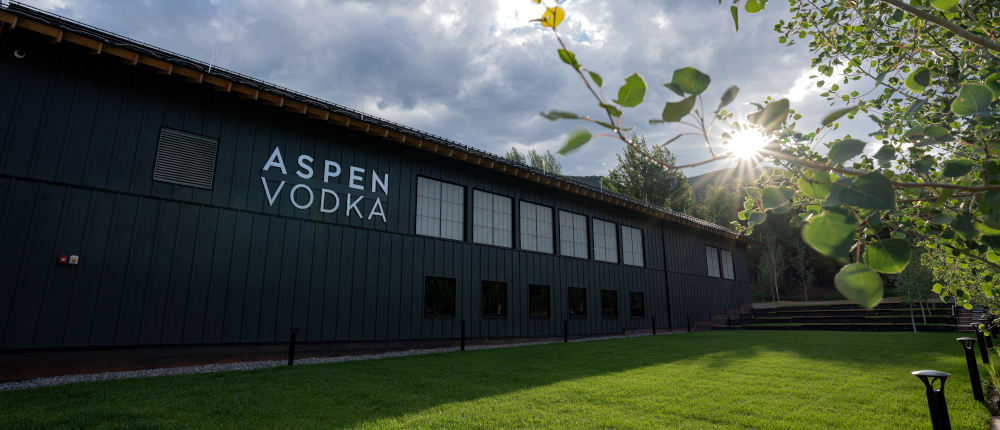There is no shortage of spirits companies touting sustainability initiatives —
whether that’s a commitment to
renewables
or biodiversity
conservation,
or embracing circularity by upcycling spent
ingredients
and adopting closed-loop packaging and distribution
solutions.
But at its core, spirits production is resource-intensive — requiring lots of
energy and water to distill the product, along with the required freight to get
it to the consumer.
These considerations make Aspen Distillers’ LEED
V4 BD+C (Building Design + Construction) Platinum certification
— the highest-possible for manufacturing — a notable achievement, even for a
relatively small operation.
The LEED certification process is rigorous. The US Green Buildings Council
(USGBC), which oversees the program, requires applicants
to meet a number of environmental-savings
requirements
— including water treatment, energy performance, land protection and more.
Platinum is the highest of four levels of certification; according to a recent
Westword
piece
on the distillery, only 1,500 US projects have achieved Platinum certification.
Aspen Vodka founder Matt
Patel told Sustainable
Brands® (SB) that the toughest part of earning the certification was
meeting LEED’s stringent material-sourcing
requirements
for a fast-tracked construction project that came to life during the pandemic
and at a somewhat remote locale at nearly 8,000 feet in elevation.
“The challenge was out there, and we were willing to accept it,” Patel says.
A distillery built for the future
 Image credit: Aspen Vodka
Image credit: Aspen Vodka
The 18,000-square-foot, carbon-negative
distillery opened in June and is
initially operating just a couple of days per week. While Patel declined to
share volume numbers, he says he hopes to build up to a capacity of 12,000 cases
by the end of the first year of operation. He adds that he hasn’t calculated the
potential maximum capacity of the facility, as the brand builds out long-term
projections.
“We entered the partnership with Aspen Vodka and the distillery because we
believe they can carve out a space in this category,” says Sean
Penn, COO of spirits
incubator WES Brands —which began a strategic
partnership
with Aspen Vodka earlier this year to help the brand grow into more markets.
The premium vodka brand is already touting impressive potential figures about
the distillery’s sustainability performance — the facility is fully electric and
net-positive energy, meaning it’s designed to generate five times more energy
than it consumes with both on- and offsite renewables and battery storage.
There’s also a complex water-treatment process that returns all used water to
the nearby Roaring Fork River cleaner than when it entered the distillery.
Aspen Vodka claims the distillery has a 26 percent reduction in embodied
carbon
through a verified building lifecycle assessment, and it offers spent grains to
nearby Dooley Creek Farm as supplementary
livestock feed and compost.
From sustainability to regeneration
 Image credit: Aspen Vodka
Image credit: Aspen Vodka
But Patel says the company isn’t resting on its laurels; its next ambition for
the distillery is to earn the ILFI’s Living Building
Challenge (LBC) certification — the most
advanced measure of sustainability in the built environment — which will take at
least another year.
Through the LBC process, Aspen Vodka collaborated on a plan with the Aspen
Center for Environmental Studies (ACES) — which develops models for
replicable, regenerative agriculture where food production can restore soil
biodiversity and mitigate climate change —that utilizes nutrient-rich sediment
from ACES’ restoration project of nearby Hallam Lake Nature
Preserve to provide a
sustainable soil amendment for the distillery property and help improve aquatic
biodiversity at Hallam Lake.
Part of the Living Building Challenge, referred to as the “Place
Petal,”
requires restoring previously disturbed areas in order to invite nature’s
functions “back into a healthy interface with the built environment;” the Aspen
Vodka distillery sits on a rehabilitated lumber yard, where a special focus was
put on revitalizing the soil.
But the vodka brand is working with ACES to enhance the long-term, regenerative
impacts of the distillery: The two organizations are piloting a new extension to
the ACES Agriculture Apprentice
Program that will
enable interested graduates to operate a regenerative farm on the distillery
land — to help cultivate the next generation of farmers while serving as a local
ingredient source for culinary partners in Aspen.
In the meantime, Aspen Distillers’ holistic approach to future-proofing spirits
production is proof of concept for larger spirits companies that distilling can
have a substantially lower — or even, positive — impact while being commercially
viable.
“I had a singular goal not only to make the world’s best vodka, but do it in a
way that I could feel good about,” Patel says.
Get the latest insights, trends, and innovations to help position yourself at the forefront of sustainable business leadership—delivered straight to your inbox.
Geoff is a freelance journalist and copywriter focused on making the world a better place through compelling copy. He covers everything from apparel to travel while helping brands worldwide craft their messaging. In addition to Sustainable Brands, he's currently a contributor at Penta, AskMen.com, Field Mag and many others. You can check out more of his work at geoffnudelman.com.
Published Aug 23, 2024 8am EDT / 5am PDT / 1pm BST / 2pm CEST